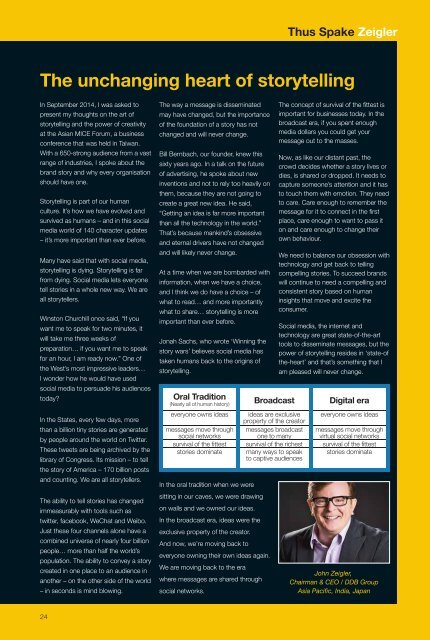1IFjBuQ
1IFjBuQ
1IFjBuQ
Create successful ePaper yourself
Turn your PDF publications into a flip-book with our unique Google optimized e-Paper software.
Thus Spake Zeigler<br />
The unchanging heart of storytelling<br />
In September 2014, I was asked to<br />
present my thoughts on the art of<br />
storytelling and the power of creativity<br />
at the Asian MICE Forum, a business<br />
conference that was held in Taiwan.<br />
With a 650-strong audience from a vast<br />
range of industries, I spoke about the<br />
brand story and why every organisation<br />
should have one.<br />
Storytelling is part of our human<br />
culture. It’s how we have evolved and<br />
survived as humans – and in this social<br />
media world of 140 character updates<br />
– it’s more important than ever before.<br />
Many have said that with social media,<br />
storytelling is dying. Storytelling is far<br />
from dying. Social media lets everyone<br />
tell stories in a whole new way. We are<br />
all storytellers.<br />
Winston Churchill once said, “If you<br />
want me to speak for two minutes, it<br />
will take me three weeks of<br />
preparation… if you want me to speak<br />
for an hour, I am ready now.” One of<br />
the West’s most impressive leaders…<br />
I wonder how he would have used<br />
social media to persuade his audiences<br />
today<br />
In the States, every few days, more<br />
than a billion tiny stories are generated<br />
by people around the world on Twitter.<br />
These tweets are being archived by the<br />
library of Congress. Its mission – to tell<br />
the story of America – 170 billion posts<br />
and counting. We are all storytellers.<br />
The way a message is disseminated<br />
may have changed, but the importance<br />
of the foundation of a story has not<br />
changed and will never change.<br />
Bill Bernbach, our founder, knew this<br />
sixty years ago. In a talk on the future<br />
of advertising, he spoke about new<br />
inventions and not to rely too heavily on<br />
them, because they are not going to<br />
create a great new idea. He said,<br />
“Getting an idea is far more important<br />
than all the technology in the world.”<br />
That’s because mankind’s obsessive<br />
and eternal drivers have not changed<br />
and will likely never change.<br />
At a time when we are bombarded with<br />
information, when we have a choice,<br />
and I think we do have a choice – of<br />
what to read… and more importantly<br />
what to share… storytelling is more<br />
important than ever before.<br />
Jonah Sachs, who wrote ‘Winning the<br />
story wars’ believes social media has<br />
taken humans back to the origins of<br />
storytelling.<br />
Oral Tradition<br />
(Nearly all of human history)<br />
everyone owns ideas<br />
messages move through<br />
social networks<br />
survival of the fittest<br />
stories dominate<br />
In the oral tradition when we were<br />
Broadcast<br />
ideas are exclusive<br />
property of the creator<br />
messages broadcast<br />
one to many<br />
survival of the richest<br />
many ways to speak<br />
to captive audiences<br />
The concept of survival of the fittest is<br />
important for businesses today. In the<br />
broadcast era, if you spent enough<br />
media dollars you could get your<br />
message out to the masses.<br />
Now, as like our distant past, the<br />
crowd decides whether a story lives or<br />
dies, is shared or dropped. It needs to<br />
capture someone’s attention and it has<br />
to touch them with emotion. They need<br />
to care. Care enough to remember the<br />
message for it to connect in the first<br />
place, care enough to want to pass it<br />
on and care enough to change their<br />
own behaviour.<br />
We need to balance our obsession with<br />
technology and get back to telling<br />
compelling stories. To succeed brands<br />
will continue to need a compelling and<br />
consistent story based on human<br />
insights that move and excite the<br />
consumer.<br />
Social media, the internet and<br />
technology are great state-of-the-art<br />
tools to disseminate messages, but the<br />
power of storytelling resides in ‘state-of<br />
the-heart’ and that’s something that I<br />
am pleased will never change.<br />
Digital era<br />
everyone owns ideas<br />
messages move through<br />
virtual social networks<br />
survival of the fittest<br />
stories dominate<br />
The ability to tell stories has changed<br />
immeasurably with tools such as<br />
twitter, facebook, WeChat and Weibo.<br />
Just these four channels alone have a<br />
combined universe of nearly four billion<br />
people… more than half the world’s<br />
population. The ability to convey a story<br />
created in one place to an audience in<br />
another – on the other side of the world<br />
– in seconds is mind blowing.<br />
sitting in our caves, we were drawing<br />
on walls and we owned our ideas.<br />
In the broadcast era, ideas were the<br />
exclusive property of the creator.<br />
And now, we’re moving back to<br />
everyone owning their own ideas again.<br />
We are moving back to the era<br />
where messages are shared through<br />
social networks.<br />
John Zeigler,<br />
Chairman & CEO / DDB Group<br />
Asia Pacific, India, Japan<br />
24


